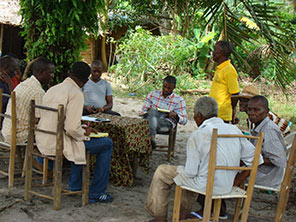Liberians demonstrate resilience in the face of threats to peace

On 29 April, the Platform for Dialogue and Peace (P4DP), our partner in Liberia, will convene a one day validation workshop to present the findings of its nationwide research. This research has explored the capacities and strategies for resilience that Liberians possess to overcome and prevent conflict. The work in Liberia is part of the Frameworks for Assessing Resilience (FAR) project, which is currently being piloted in Liberia, Guatemala and Timor-Leste. The project’s overall objective is to provide guidance on assessing resilience from the point of view of local actors in ways that are context specific.
The first phase of the FAR project was the consultation process, which ran from June 2014 to February 2015. Over 1,100 Liberians were consulted through focus group discussions and interviews with key stakeholders in all fifteen counties. The team consulted a diverse range of sectors of society, including local communities and authorities, policy-makers, donors and regional organizations, civil society, as well as religious, social, cultural and political institutions.
Liberians display resilience in response to drivers of conflict
The findings from the consultation phase demonstrate that Liberians are resilient in the face of three key structural drivers of violent conflict. Liberians discussed how they deal with three sources of conflict in particular: shifting gender identities and the patriarchal structure of society; increasing pressure linked to poor regulation of land; and the weakness of the state evidenced in governance failures and poor access to public goods.
In light of these challenges, Liberians turn to traditional customs and dispute resolution mechanisms or migrate to areas where there are more opportunities. Some communities have set up communal farming or village savings clubs, these are groups that farm land together and save the earnings so that they can be shared with members who are going through tough times. The organizational capacity and solidarity of communities is also leveraged to provide security such as by forming vigilante groups.
In most cases, the strategies developed enable people to cope with the immediate consequences of the above mentioned threats to peace. There were nonetheless some initiatives that had the potential to address and displace the root causes of conflict: community dialogue and media advocacy are two examples. Dialogue not only allows community members to voice their emotions and frustrations, but also actively allows them to point out governance failures, that are seen by many Liberians as a primary cause of the hardships and inequities they face. At the other end of the spectrum, the research unveiled some resilience mechanisms that have the potential to fuel conflict in the long term such as the involvement of young men in motorbike clubs. On the one hand, these clubs provide a source of income and a sense of belonging to the young people, but on the other hand many Liberians perceive these groups as dangerous as they have provoked violence and disruption in the past.
The Liberian pilot project – a unique situation
The Liberian pilot had the particularity of being conducted during the Ebola crisis. As a result, the research team used this unique situation to study how a sudden and unpredictable crisis interacts with the challenges that exist in a post-conflict environment. The Ebola crisis both magnified the threats to peace and was itself exacerbated by these underlying sources of conflict, notably the weakness of the state. The initial state response to Ebola was seen as ineffective because it did not take into consideration the impact that the crisis was having on social cohesion and trust, for example by suppressing the behavioural norms that regulated daily life. Only when it started working through community initiatives and respecting traditional norms did the Ebola response become more effective. In fact, some of these initiatives have the potential to positively impact resilience in the long term.
A Validation Forum to present the findings and prioritize entry points for the National Working Group
The Validation Forum will convene approximately 60 participants from across the country and key representatives of government, civil society, the private sector and academia. Together, they will validate the findings of the research and grant P4DP the mandate to move forward with the Frameworks for Assessing Resilience (FAR) programme in Liberia. Concretely, this will involve setting up a working group composed of national stakeholders who will extend the preliminary research. Particular attention will be given to how the previously identified resilience mechanisms can best contribute to durable peace. The working group will also make recommendations on how to strengthen these factors of resilience and propose methods to assess progress in peacebuilding.
The Frameworks for Assessing Resilience (FAR) project is made possible with the generous support of the Swedish International Development Cooperation Agency (SIDA).























